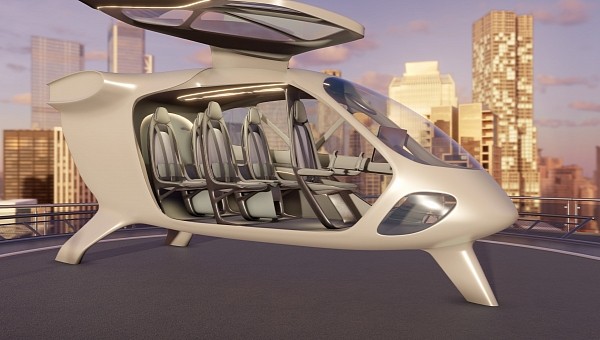Compared to most air taxi developers, Supernal has kept things relatively quiet so far, but it looks like it’s taking a big step in advancing its eVTOL design, with the help of a major partner.
Heralded as the solution for the democratization of mobility, eVTOLs (electric vertical take-off and landing) are also showcasing the same principle within the aviation industry. No matter if it’s a young startup or an established manufacturer, and regardless of the location, everyone has the chance to come up with its version of a future flying taxi.
Several eVTOL manufacturers have emerged as AAM (Advanced Air Mobility) branches of major names in different mobility sectors. Eve, for example, is the AAM subsidiary of aircraft manufacturer Embraer, while Supernal is the AAM division of Hyundai Motor Group. Initially named Hyundai’s Urban Air Mobility Division, and launched in 2020, it eventually became known as Supernal.
In the fall of 2022, Supernal finally revealed a five-seat cabin concept, but still kept most of the technical specs under wraps. However, judging by the names chosen to collaborate on this project, we can probably expect top performance. BAE Systems will provide a lightweight, fly-by-wire technology for easy maneuvering (when the future eVTOL is not in autonomous mode), while Honeywell’s Anthem solution will help create a cloud-connected cockpit.
It sounds good theoretically, but how is this thing going to be built? Apparently, using state-of-the-art simulation technology. Project AirSim is the name of a simulation platform developed by Microsoft, that’s artificial intelligence (AI) driven. It’s specifically meant for building, testing, and training autonomous air vehicles, and Supernal will use it for its eVTOL as well.
Through AirSim, a manufacturer can simulate all phases of flight, in various weather conditions. It also provides access to 3D environments mimicking both urban and rural landscapes. All of this can be used to develop machine learning models. In other words, it acts as a highly-advanced platform for virtually building and testing eVTOLs.
On top of that, Supernal will use Microsoft’s HoloLens 2, a mixed-reality headset. That’s the manufacturing and maintenance of tomorrow – technicians wear this headset in order to get unprecedented visual feedback during different types of operations.
As complex as all of that sounds, it’s just the initial phase of Supernal’s collaboration with Microsoft. The two will also work on integrating cloud technology for information sharing, and advanced autonomous operations onboard air taxis.
With Microsoft onboard, the Korean team is one step closer to commercialization, even though it’s a bit behind other major eVTOL manufacturers. While some of them are ready for their air taxis to enter service within the next two years, Supernal expects to officially launch its eVTOL in 2028, and kick off operations by 2030.
Several eVTOL manufacturers have emerged as AAM (Advanced Air Mobility) branches of major names in different mobility sectors. Eve, for example, is the AAM subsidiary of aircraft manufacturer Embraer, while Supernal is the AAM division of Hyundai Motor Group. Initially named Hyundai’s Urban Air Mobility Division, and launched in 2020, it eventually became known as Supernal.
In the fall of 2022, Supernal finally revealed a five-seat cabin concept, but still kept most of the technical specs under wraps. However, judging by the names chosen to collaborate on this project, we can probably expect top performance. BAE Systems will provide a lightweight, fly-by-wire technology for easy maneuvering (when the future eVTOL is not in autonomous mode), while Honeywell’s Anthem solution will help create a cloud-connected cockpit.
It sounds good theoretically, but how is this thing going to be built? Apparently, using state-of-the-art simulation technology. Project AirSim is the name of a simulation platform developed by Microsoft, that’s artificial intelligence (AI) driven. It’s specifically meant for building, testing, and training autonomous air vehicles, and Supernal will use it for its eVTOL as well.
Through AirSim, a manufacturer can simulate all phases of flight, in various weather conditions. It also provides access to 3D environments mimicking both urban and rural landscapes. All of this can be used to develop machine learning models. In other words, it acts as a highly-advanced platform for virtually building and testing eVTOLs.
On top of that, Supernal will use Microsoft’s HoloLens 2, a mixed-reality headset. That’s the manufacturing and maintenance of tomorrow – technicians wear this headset in order to get unprecedented visual feedback during different types of operations.
As complex as all of that sounds, it’s just the initial phase of Supernal’s collaboration with Microsoft. The two will also work on integrating cloud technology for information sharing, and advanced autonomous operations onboard air taxis.
With Microsoft onboard, the Korean team is one step closer to commercialization, even though it’s a bit behind other major eVTOL manufacturers. While some of them are ready for their air taxis to enter service within the next two years, Supernal expects to officially launch its eVTOL in 2028, and kick off operations by 2030.







